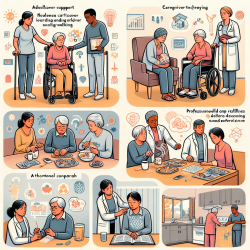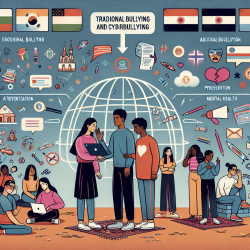Introduction
As practitioners dedicated to enhancing the lives of children and adolescents, it is crucial to stay informed about the latest research and methodologies that can improve educational outcomes. The recent study titled "Protocol for a Multi-Country Implementation Research Study to Assess the Feasibility, Acceptability, and Effectiveness of Context-Specific Actions to Train and Support Facilitators to Deliver Sexuality Education to Young People in Out-of-School Settings" offers significant insights into how we can better prepare facilitators to deliver comprehensive sexuality education (CSE) in non-traditional settings.
Research Overview
The study, conducted across Colombia, Ethiopia, Ghana, and Malawi, aims to evaluate the effectiveness of training and supporting facilitators in delivering CSE to young people who are out of school. This demographic often misses out on crucial sexual and reproductive health education due to various socio-economic and cultural barriers. The research focuses on understanding the unique challenges and opportunities present in out-of-school contexts and developing strategies to overcome them.
Key Findings and Implications for Practitioners
The research highlights several critical areas for practitioners to consider:
- Facilitator Preparedness: The study emphasizes the need for facilitators to be well-prepared not only in content knowledge but also in creating a safe and engaging learning environment. Training programs should focus on building both the technical skills and the soft skills necessary for effective facilitation.
- Adaptive Implementation: The study advocates for adaptive management strategies that allow facilitators to modify their approaches based on the specific needs and circumstances of their audience. This flexibility is crucial in addressing the diverse backgrounds and experiences of out-of-school youth.
- Community Engagement: Building support among parents and community members is essential for the success of CSE programs. Practitioners should work towards fostering community buy-in and addressing any resistance or misconceptions about sexuality education.
- Continuous Support and Monitoring: Ongoing mentorship and support for facilitators are vital. Regular feedback and refresher training sessions can help maintain high standards of delivery and address any challenges that arise during program implementation.
Encouraging Further Research
While the study provides valuable insights, it also highlights the need for further research, particularly in understanding the long-term impacts of CSE programs on out-of-school youth. Practitioners are encouraged to engage in research initiatives and contribute to the growing body of evidence on effective CSE delivery.
Conclusion
By implementing the findings from this study, practitioners can enhance their skills and improve the delivery of CSE in out-of-school settings. This will not only empower young people with the knowledge they need to make informed decisions but also contribute to broader societal goals of health and gender equality.
To read the original research paper, please follow this link: Protocol for a multi-country implementation research study to assess the feasibility, acceptability, and effectiveness of context-specific actions to train and support facilitators to deliver sexuality education to young people in out-of-school settings.










